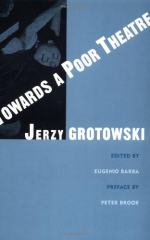
|
| Name: _________________________ | Period: ___________________ |
This quiz consists of 5 multiple choice and 5 short answer questions through Theatre is an Encounter, and Akropolis: Treatment of the Text.
Multiple Choice Questions
1. What does Grotowski say is as important in the education of the actor as it is to a pianist or dancer?
(a) Psychology.
(b) Looks.
(c) Talent.
(d) Age.
2. Grotowski states in "Theatre is an Encounter", that when we think of Chekhov, we think of his plays in whose style?
(a) Meyerhold's.
(b) Stanislavski's.
(c) Chekhov's.
(d) Dostoevsky's.
3. Whose work on "physical actions" is incorporated into Grotowski's system?
(a) Stanislavski's.
(b) Dullin's.
(c) Brecht's.
(d) Artaud's.
4. Grotowski states in "Theatre is an Encounter" that he gravitates toward the great romantic poets of Poland, but also to the works of Calderon and _____.
(a) Socrates.
(b) Shakespeare.
(c) Homer.
(d) Marlowe.
5. Whose rhythm exercises does Grotowski find most important?
(a) Dullin's.
(b) Delsarte's.
(c) Brecht's.
(d) Stanislavski's.
Short Answer Questions
1. In "The Theatre's New Testament," Grotowski says, "The elaboration of artificiality is a question of _____ - sounds and gestures - which evoke associations in the psyche of the audience."
2. Grotowski's "holy actor" does not sell his body but _____ .
3. When did the interview for "Theatre is an Encounter" take place?
4. What does "he who once dreamed of becoming a playwright" usually end up as, according to Grotowski?
5. Whose investigations of extroversive and introversive reactions are incorporated into Grotowski's system?
|
This section contains 207 words (approx. 1 page at 300 words per page) |

|




